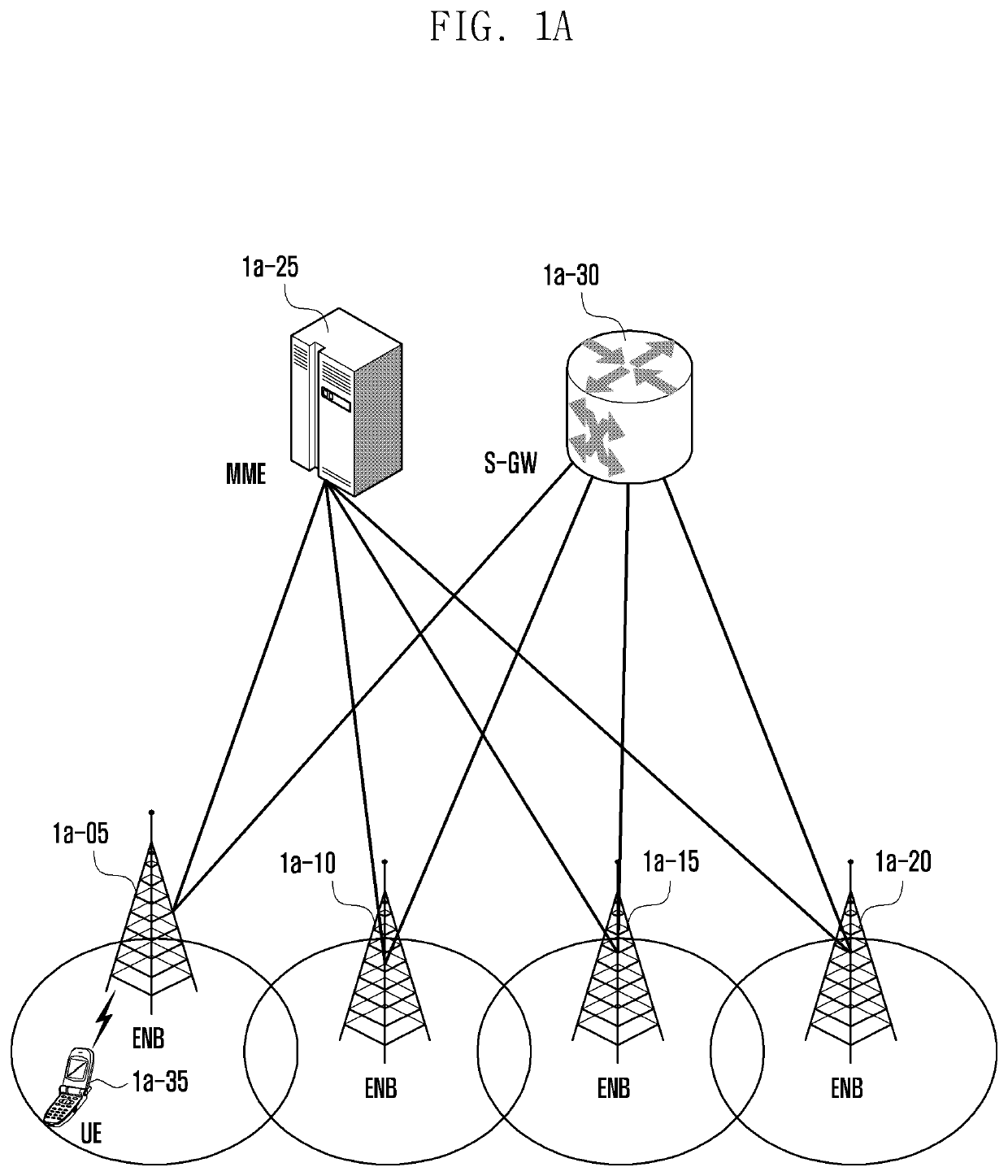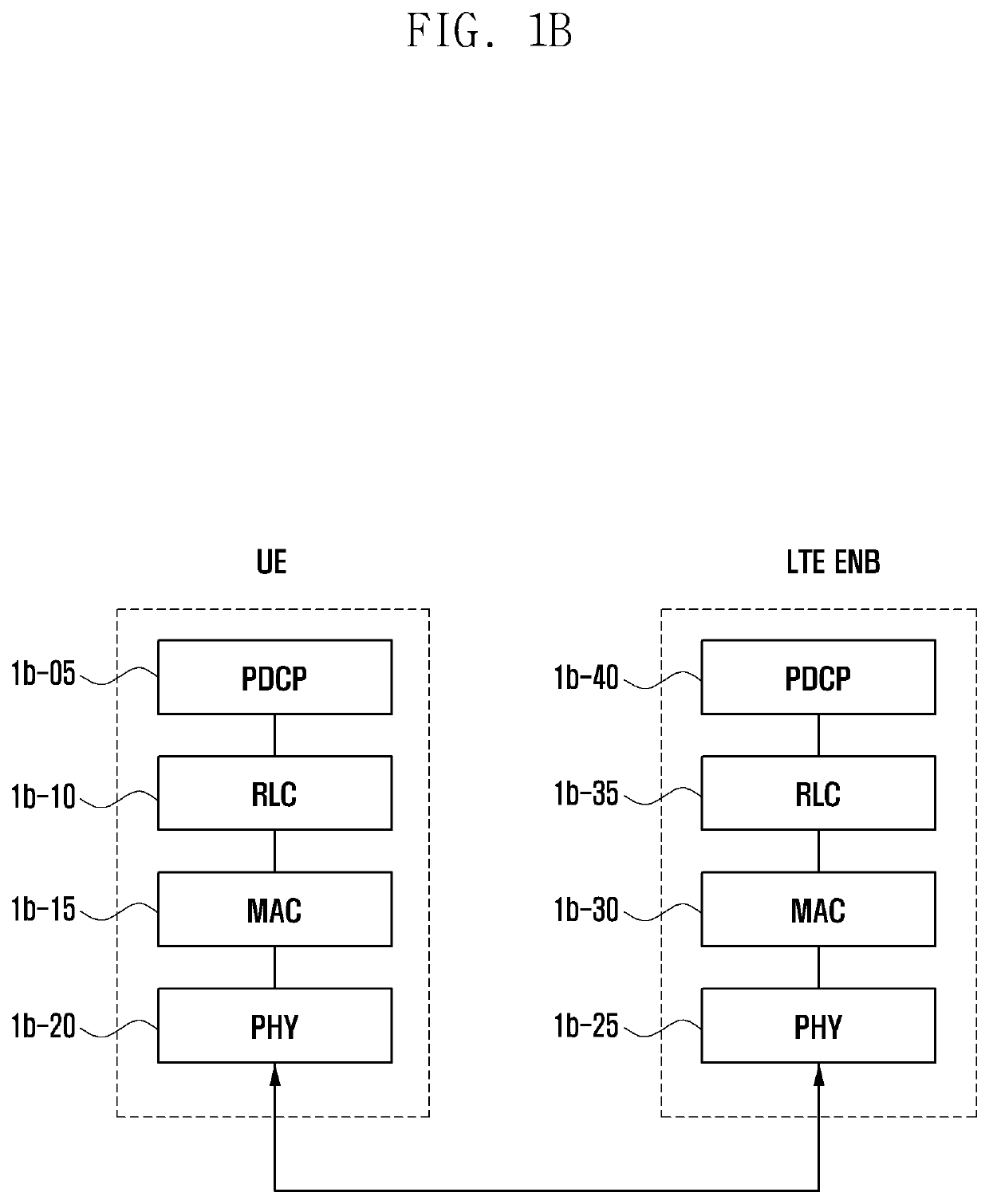Method and apparatus for communication in wireless mobile communication system
a wireless mobile communication and wireless technology, applied in power management, transmission path division, high-level techniques, etc., can solve the problems of rapid consumption of terminal power and difficulty in meeting the requirements of the next-generation mobile communication system requiring a low latency, and achieve high data rate, low cost, and high speed
- Summary
- Abstract
- Description
- Claims
- Application Information
AI Technical Summary
Benefits of technology
Problems solved by technology
Method used
Image
Examples
embodiment 1
[0092]FIG. 1A is a diagram of an LTE system, according to an embodiment of the present disclosure.
[0093]Referring to FIG. 1A, a RAN of an LTE system includes evolved node Bs (“eNBs”“ENBs, “node Bs”, or “base stations”) 1a-05, 1a-10, 1a-15, and 1a-20, a mobility management entity (MME) 1a-25, and a serving-gateway (S-GW) 1a-30. User equipment (“UE” or “terminal”) 1a-35 accesses to an external network through the ENBs 1a-05, 1a-10, 1a-15, and 1a-20 and the S-GW 1a-30.
[0094]The ENBs 1a-05, 1a-10, 1a-15, and 1a-20 correspond to an existing node B of a universal mobile telecommunications system (UMTS). The ENBs 1a-05, 1a-10, 1a-15, or 1a-20 are connected to the UE 1a-35 on a radio channel, and play or serve a more complicated role than that of the existing node B. In the LTE system, since all user traffics including a real-time service, such as a voice over internet protocol (VoIP) through an internet protocol, are serviced on shared channels, devices performing scheduling through summar...
embodiment 2
[0240]FIG. 2A is a diagram of an LTE system, according to an embodiment of the present disclosure.
[0241]Referring to FIG. 2A, as illustrated, a RAN of an LTE system includes ENBs 2a-05, 2a-10, 2a-15, and 2a-20, an MME 2a-25, and an S-GW 2a-30. “UE 2a-35 accesses to an external network through the ENBs 2a-05, 2a-10, 2a-15, and 2a-20 and the S-GW 2a-30.
[0242]In FIG. 2A, the ENB 2a-05, 2a-10, 2a-15, and 2a-20 correspond to an existing node B of a UMTS system. The ENBs 2a-05, 2a-10, 2a-15, or 2a-20 are connected to the UE 2a-35 on a radio channel, and plays a more complicated role than that of the existing node B. In the LTE system, since all user traffics including a real-time service, such as a VoIP through an internet protocol, are serviced on shared channels, devices performing scheduling through consolidation of state information, such as a buffer state, an available transmission power state, and a channel state of each UE, are necessary, and the ENBs 2a-05, 2a-10, 2a-15, and 2a-20...
embodiment 3
[0412]FIG. 3A is a diagram of an LTE system, according to an embodiment of the present disclosure.
[0413]A RAN of an LTE system includes ENBs 3a-05, 3a-10, 3a-15, and 3a-20, an MME 3a-25, and an S-GW 3a-30. A UE 3a-35 accesses to an external network through the ENBs 3a-05, 3a-10, 3a-15, and 3a-20 and the S-GW 3a-30.
[0414]In FIG. 3A, the ENBs 3a-05, 3a-10, 3a-15, and 3a-20 correspond to an existing node B of a UMTS system. The ENB 3a-05 is connected to the UE 3a-35 on a radio channel, and plays a more complicated role than that of the existing node B. In the LTE system, since all user traffics including a real-time service, such as a VoIP through an internet protocol, are serviced on shared channels, devices performing scheduling through consolidation of state information, such as a buffer state, an available transmission power state, and a channel state of each UE, are necessary, and the ENBs 3a-05, 3a-10, 3a-15, and 3a-20 correspond to such scheduling devices. One ENB controls a plu...
PUM
 Login to View More
Login to View More Abstract
Description
Claims
Application Information
 Login to View More
Login to View More - R&D
- Intellectual Property
- Life Sciences
- Materials
- Tech Scout
- Unparalleled Data Quality
- Higher Quality Content
- 60% Fewer Hallucinations
Browse by: Latest US Patents, China's latest patents, Technical Efficacy Thesaurus, Application Domain, Technology Topic, Popular Technical Reports.
© 2025 PatSnap. All rights reserved.Legal|Privacy policy|Modern Slavery Act Transparency Statement|Sitemap|About US| Contact US: help@patsnap.com



